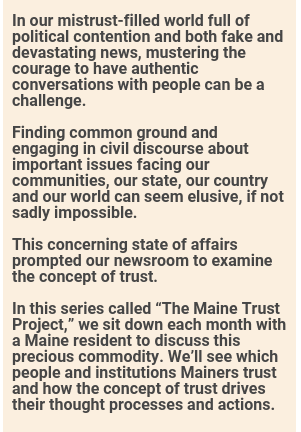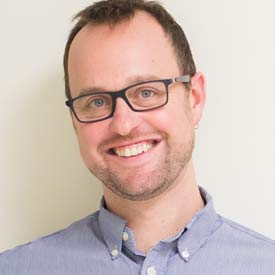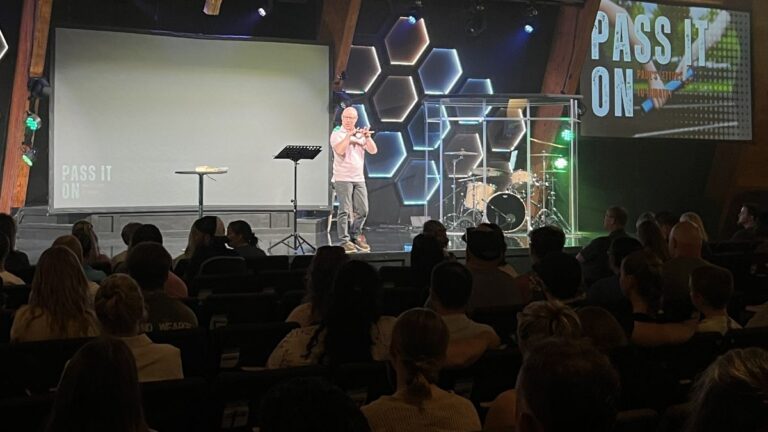Neuroscientist Michael Burman spends a lot of his time as an associate professor of psychology at the University of New England in Biddeford teaching his students that their sensory experiences are not trustworthy.
A simple way to wrap your head around that concept is to think about visual illusions that trick the brain, such as the three lines with arrow heads that each have a different orientation, making the lines look like they’re different lengths, when they really aren’t.
 “What you see and how you perceive the world is related to what’s really there,” he said, “but is not in any way an accurate or true representation.”
“What you see and how you perceive the world is related to what’s really there,” he said, “but is not in any way an accurate or true representation.”
Does that mean we can’t trust our own brains? If we can’t trust our brains to perceive what’s real — whether that be a line with arrows or a person you’re relating to – then how does trust develop? How do we — our brains — even form trust?
When we talk about the brain and forming trust, we have to be a little bit careful, Mike said, “because the words we like to use don’t always intersect exactly with what the brain is doing.”
With that note of caution, there’s no doubt that trust is fundamental to human functioning and survival, he said. But there isn’t any particular part of our brain — no specific structure — that we can point to as the location where we form trust. Rather, many brain systems are involved in what we generally call “trust.”
From an evolutionary perspective, “trust” is based on the brain creating systems to provide us with information from which we can make decisions. So, for instance, our brains are trying to figure out: Am I going to find food? Is this a reliable source of food? Is shelter reliable here? Is the person who is supposed to be protecting our tribe actually protecting us? Am I safe? Can I figure out this world?
“We developed all these different systems to start answering some of those pieces,” Mike said.
For example, our brains developed memory systems that see consistencies and start to build patterns to compare what we think is going to happen, what happened last time and what is happening now, he said. Our brains build emotional attachment systems with the people who take care of us, and a threat system to alert us to possible danger.

These various systems operating in our brains help us figure out the world, teaching us what we can “trust,” so we can survive and stay safe, and how to obtain reliable relationships, food and shelter.
The experiences our brains have of the world, from the womb through early childhood, and our interactions with caregivers, shape the patterns our brains build to figure out who and what can be trusted, for the rest of our lives.
If we are lucky, those early experiences set up patterns that allow us to be resilient and able to trust. But if our early experiences are more traumatic — poverty, child abuse and neglect, war — then our brains are likely to form patterns that make trusting difficult, if not impossible.
But all is not gloom and doom if you experienced trauma while your brain was developing, he said. “Early in life your brain is really plastic — that’s the word we use to mean moldable or changeable — and less so later,” he said. “But less plastic doesn’t mean less changeable, doesn’t mean non-changeable, and that’s good news.”
That means, even as adults, our brains, with some effort, can create new patterns, and experience what it is to trust.
Q&A
Who meets your definition of trust?
Mike: Family and friends and neighbors and coworkers. I’m blessed to be surrounded by great people. But your questions got me thinking more broadly about trusting governments and political organizations, businesses, and things like that. I think there’s a pull to trust those things if I feel affiliated with them — like they’re most trustworthy if they’re a part of my tribe. For instance, I do a lot of shopping on Amazon. It’s not that I think the company is honest. I don’t. But I do think people like me shop on Amazon. It’s super convenient but Walmart.com is just as convenient, and I don’t shop there. I feel like Walmart doesn’t share my values, and I’m not sure Amazon does either, but I think Amazon is closer. So when it comes to who meets my definition of trust outside my family and friends, I think it’s people I think of as being in my tribe, and I think that extends to political levels and to businesses, although that was a little bit of an uncomfortable realization.
Who doesn’t meet your definition of trust?
Mike: People we’ve entrusted with positions of authority or power who then turn out not be honest and not to be trustworthy. We’ve given these people — our political leaders or religious leaders, for example — the power to help decide what’s right, what’s wrong, what’s true, what’s false, what’s ethical, what’s unethical, what’s moral, and what’s immoral, but they succumb to temptation and abuse that power.
What breaks trust for you?
Mike: When I’ve — or we’ve, collectedly — placed confidence in you and you’ve not been worthy of that confidence. That is especially true when you’ve asked for it. If I’ve asked to be a teacher and I fail to protect my children, I think that’s a special kind of violation. Or I’ve run for political office and then not upheld my oath, I think that’s a special kind of violation.
Can broken trust be healed and if so, what has to happen for healing to take place?
Mike: I think that’s hard. I don’t know. When you’ve given someone special responsibility in your life or in society and they’ve proven not worthy of it, why would you give it to them again? I’m not sure that it can, but if so, I imagine it would take a long time and would require building a whole new pattern of behavior that would again establish your trustworthiness and your commitment to being worthy of it.
Has your definition of trust changed over the years?
Mike: Not over the years. It’s changed over the last couple of days because of these questions. Seventy-two hours ago I would have said that trust had a lot more to do with honesty than anything else, but now I’ve come to see these other aspects of it. It’s not just honesty. As we discussed earlier, the person who threatens to shoot me if I don’t give him my money: I might trust what he’s saying, but that’s not what I mean by trust. It’s more about do they have my back? Do they have my best interests in mind? Will they be on my side, help me when I need it? I think that’s much more important now to me after a little reflection.
Do you think the cultural definition of trust has changed over the years?
Mike: Yes. In this post-truth era, you look at polling and the polls show that people don’t trust that the president is telling the truth and yet they still support him. I think that’s true of a lot of the organizations we rely on, like social media or the companies that hold our data and our financial records. I don’t think we believe they’re telling us the truth. I think our question is whether these organizations still make our lives better or not. I think that becomes the new way we define trust. Even if I don’t think that they’re honest, either about their intentions or about their practice, am I better off for them? Are they making my life easier? To be honest, I think it’s a shame that that’s our new reality. I think we really lose something when we don’t hold people to honesty.
What worries you?
Mike: I’m pretty worried. I think the world has a lot of serious challenges. I think we have climate change, which is really going to disrupt the natural world and our relationship with it. Oceans full of plastic and species that are dying. I think it might be the overwhelming catastrophe of our generation, but I think there are lots of other issues that are a close second. Such as the growing wealth disparity between rich and poor. As I understand history – although I’m not a historian – when it reaches this level, it’s not stable. Just here in Maine, we have people who are near starving and people with extreme wealth. Two different worlds that never intersect. I think our current political-economic systems are reinforcing and exacerbating those differences rather than shrinking them, and I think that’s going to lead to incredible social instability over time.
And I think we have a growing nationalism that we’re seeing at our borders and through our wars on terror. I think rather than serving to protect us — although maybe they do in the short term — they’re really serving to create generations of people who have very good reason to not like our country, and that will come back to haunt us.
What inspires you?
Mike: Those things I’m worried about seem bleak and hopeless, and I think we don’t know how to deal with any of those things now, but that doesn’t mean that we can’t and we won’t as the younger generations get involved. That’s where I get inspired. The students I see in my classroom today are incredibly earnest, hard-working, creative people who understand those challenges and are optimistic. I think they think about things and interact with the world in a way that’s different than the way I do and that gives me hope that their ways are better. The challenge for me and others who are older is to let them, and to stay out of their way while they try and disrupt the world a little bit. I think it’s going to take some disruption in order to fix those things.
What issues do you think are important today?
Mike: Education. I think our educational system hasn’t kept up with our peers’ around the world and perhaps not even kept up with where it used to be here, but education is the key to our future. We can’t solve those fundamental systemic problems we talked about until we understand them and have the tools to understand them. When I talk about education, I don’t just mean a college education. The purpose of education is to learn how to think rather than what to think, and there are a lot of ways to get the skills to do that. That’s the benefit of public libraries, for example. Public libraries are one of the great contributions that happened in early America. We democratized information and made it available to everybody.
So I don’t think it has to be a college education, although I think the value of a liberal arts education — with liberal being the Latin word for freedom rather than meaning liberal politics — is it’s supposed to teach you to be a free thinker. It’s supposed to teach you to not have to rely on others and authority figures for your beliefs and ideas, but to have the tools to form your own opinions based on the evidence and to evaluate them. It’s not indoctrinating people with a certain set of beliefs and how they should think. An education that gives you the tools to think and therefore to challenge the way we’ve always done things is the kind of education that we need to be giving people — and that doesn’t have to mean college. A good education should prepare you to trust yourself.
Get to know Michael Burman
Age: 40
Hometown: Saco
Religious affiliation: Grew up Jewish but is not actively practicing.
Political affiliation: I’m a Democrat but I think I’m radically progressive in my politics. Occasionally I have Libertarian tendencies. I wish we had a more robust third-party, fourth-party, fifth-party system. I’m kind of envious of the parliamentary system, where they get lots of choices.
How he describes himself: That’s a hard question. I’m just a guy trying to get by. I’m a parent, a professor, a scientist. I like to ski and run and paddle and be fit. I try to be kind and empathetic, although some of my students might disagree. I’m a tough-love instructor.
How he defines trust: My first thought is that trust is synonymous with honesty and a sense of integrity. But then I didn’t think honesty was enough. If someone is threatening to hurt me, I might trust that that person is telling the truth, but that doesn’t mean I trust that person. I believe them but would I “trust” them? So trust is more than honesty. It’s multifaceted. There’s the honesty aspect of it. Then there’s an attachment or affiliation aspect – that somehow we’re together and protecting each other or are mutually supportive. Then there’s this consistent safety aspect: my ability to have confidence in people and to know what the situation is going to be or what people are going to do. Can I predict how I’m going to be treated and what’s going to happen? Am I safe? And that applies not just to people. It’s the courts, law enforcement, government, my employer.







